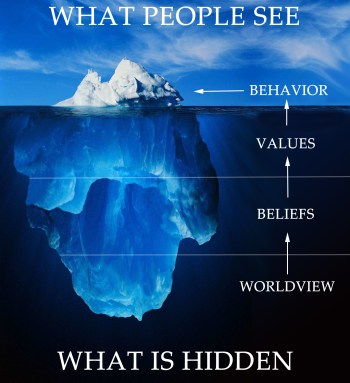
This has been a hot topic for me over the years, with numerous colleagues, almost on par with the nature vs. nurture debate (I’ll save that one for another time). When I worked in Aerospace over a decade ago, I had several debates with an HR Coach/Consultant over the need to change beliefs. He strongly believed that to make a culture change, you had to change the person’s core beliefs to have them more readily adapt to a business improvement or change. Needless to say, I disagreed with that assumption.
Beliefs to me are personal. They go beyond work, beyond home life; they are who we are and guide us to make certain decisions and judgments. Can they be changed? Absolutely! Who among us, as teenagers, believed certain things, and given enough life experiences, didn’t see many of those same things (yes, maybe not all) quite differently once we reached the ripe old age of 30, or 40 (or gulp, yes, 50). Beliefs are shaped by experiences, influences, and our environment, but they are a deeply personal set of emotions, rules, and guidelines.
My disagreement with my Coach essentially boiled down to the fact I wanted to ensure people’s behaviors at work met our standard and what we required of them. I wasn’t worried about changing their beliefs, even though I understood their beliefs could control their behaviors. It would undoubtedly make the transition easier if both could occur, but it wasn’t necessary to aid the work environment. The extreme argument is the easy one to make. A person might believe in theft, violence, or any number of crimes. As long as they controlled their behaviors at work, how they were outside of work had less impact (though not necessarily zero impact).
I acknowledge that it is an extreme case. If a person believes in taking shortcuts throughout their lives to get things done more expeditiously (ie, speed ahead of quality), is that a behaviour that needs to be changed at work? Certainly. Does it matter if their belief doesn’t change? Taking those shortcuts outside of work is less important to me. Knowing the person has that tendency does reinforce to me the need to monitor their work, but as long as the data and evidence support that they are not taking shortcuts at work, I’m quite content.
Aligning beliefs to match one’s own can be a dangerous thing. Who is to say the one person’s beliefs are correct? I think the world is a better place with a variety of opinions and perspectives. Things can go to an extreme, of course, and lines can be crossed, but having healthy debate and differences is a good thing, in work and life.
Darren
